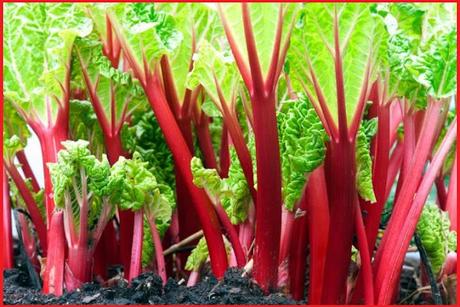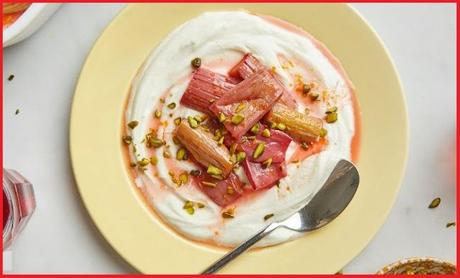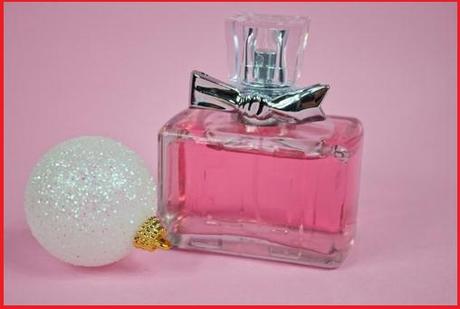
Rhubarb growing
- Rhubarb was used in traditional Chinese medicine.
- In the late 1700s it saved the lives of Canadian fur traders.
- It prevented scurvy.
- In 2010 forced rhubarb was granted Protected Designation of Origin Status.

Rhubarb Fool, a popular UK dessert
This unusual vegetable, best treated like a fruit, mostly has culinary connotations. Best planted in autumn or spring, it can be used to make jam, pies, fools (above), crumbles, charlottes and as an accompaniment to roast meat. The above are all familiar fare.In the twenty-first century, however, people have been more adventurous with this staple of the English diet. Rhubarb yoghurt is a healthy breakfast option. Rhubarb is also used in yoghurt, scones, cakes, drinks, household air fresheners and even scents! Just look online and you will find perfumes such as Rhubarbaro, Hermes Eau de Rhubarbe and The Zoo Rhubarb my Love.

a scent of Rhubarb
Its commercial potential is perhaps appreciated in one of the harshest climates of England. West Yorkshire has a 23-kilometre area between Leeds, Wakefield and Bradford with a claim to fame as the Rhubarb Triangle. It produces early forced rhubarb, which results in the plants having gorgeous red or pink coloured stems.Forcing is achieved by stopping light from the sun reaching the crowns of the rhubarb, the heart of this vegetable that is planted in the soil. In the triangle, rhubarb plants spend two years outside, storing energy from the sun in their roots, then are taken from the ground and kept in dark, heated sheds.We can nowadays all experience the wonders of rhubarb through the three-day Wakefield Rhubarb Festival, held in February, and a delight of entertainment, cookery demonstrations with celebrity chefs, children’s activities and market stalls that sell pies, crumbles and stalks.This year, the Rhubarb Festival between 17th and 19th February was featured in The People’s Friend Special and the article stated that a Rhu-bar not only served rhubarb flavoured beers and gins but also a “rhubarb-based liqueur” that tastes fabulous with prosecco, ginger ale or ice cream!
The magazine issue 238 states that more information is available at: experiencewakefield.co.ukThis article would not be complete without the inclusion of a remarkable man and celebrated personality of Tottenham: Rhubarb the Clown.His real name is Martin Sollity, and he has worked a in countries across continents including in Australia, Oman, Qatar, India Denmark, Germany and Iceland. He has worked with Peter Maxwell Davies in The Fires on London Theatre Group and Clairmont Theatre Group.He represented the UK at the Montreal Festival pour les Enfants and his many TV credits include BBC1 Shakespeare in Perspective, Pebble Mill at One, Icelandic TV, Channel 4’s Unforgettable Christmas, BBC2’s You and Me and GMTV.He has appeared at the London Palladium, the Apollo and Lyric theatres, and at festivals such as Notting Hill. He has also performed for local authorities, schools, hotels, stores, (including Harrods), and at private parties. A review in The Times reported his “witty, brilliant clowning.”
Now seventy-six and a grandfather, I interviewed him at his home for this article, after he supported a new local cinema initiative Screen Team, where locals of Tottenham can see a free film on the last Friday of every month.
When I asked about his unusual choice of career, he said,
“I was influenced by Commedia del Arte and did a lot of classes at Oval House, which, at the time, was turning from a Youth Club into a theater place. The classes started with improvisation, then mime, clowning, juggling and acrobatics.”
He also mastered the art of the unicycle.
He is very fond of babies and small children, saying he has cuddled loads of babies over the years!
When I asked him about why he chose the name Rhubarb it was a long story, caused by a sequence of events.
Through a romantic association when starting his career, he ended up at the Moomba Festival in Melbourne, Australia working with a group of people. During the festival they were approached individually around an open space. When asked what he wanted to call himself, Rhubarb came to mind because he liked the associations with it.
These were –
- He was born in Leeds, (on the corner of the Rhubarb triangle!)
- There is a sweet and sour association, which seemed appropriate.
- The nonsense phrase “Rhubarb Rhubarb” represents crowd noise on stage.
What’s love got to do with it? A lot by the sound of it! A glittering and satisfying career followed, bringing delight to children and families all over the world.
When I tapped into the mystique of being a clown, he said,
“It’s all about how things are presented,” adding,
“Fear and laughter are close to each other. It’s about how comfortable people feel in a space. I feel when I go into a space as a clown how comfortable people are.”
His clown is conversational but does not talk. He explained,
“Your clown is dependent on audience reaction.”
His clown is extremely popular with deaf children.
“What’s the significance of the clown in society?” I asked.
He replied,
“The Clown is an aspect of society, and the way humans behave.”
When I pointed out their sparsity today and he said,
“Clowns are out of fashion but re-invent themselves.”
Current propaganda around clowns being scary, with the vile real-life twentieth century murderer John Wayne Gacey, who used his clown persona to murder young men and creepy clowns of fiction such as in Stephen King’s book “It” and films like “The Joker” cannot have helped!
A conversation with Rhubarb a.k.a. Mr Martin Sollity invited the conclusion that a return to innocence and slapstick, bringing joy and fun into the lives of society’s most vulnerable children is what our world needs now.More about Rhubarb the Clown is on www.rhubarbtheclown.co.uk
On that note, Viva Rhubarb!
Anne Gaelan. Email ThisBlogThis!Share to TwitterShare to Facebook